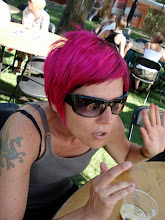
Today is supposed to be a day off, but that doesn't actually happen in Sept, Oct or Nov. Too much going on with students, orders and craft shows. Today I threw 1/3 of the KHMR mug order. Things are getting exciting with them, a bit of variety in the style and colour as well as an increase in the total number. I like a little variety with my orders.
While I was throwing I was thinking about training in the field of ceramics. I live in a small town where opportunities are somewhat limited in the art training field. I always wonder if my work would grow faster and be better if I had some more formalized ceramics training. I started throwing about 7 years ago. I am mostly self-taught. I have taken a few hand-building/raku courses, I have taken a 3 day workshop with potter Dee Funk, I have taken two short courses at Red Deer College, I have done a 1 year apprenticeship with local potter Lee Bedford of Canyon Creek Pottery, I have thrown and thrown and thrown now steady for 2 years. I want more training. I am thinking about doing a distance ceramics diploma from Australia National University. Two years, lots of learning. Janet DeBoos is the head of program and I LOVE her work (see above photo). She is my ceramics hero. So my potter question to you is: What experience and training do you have? How do you feel about this? What do you wish you had done, what do you wish you hadn't done? Please comment or email me, I would love to know how your experience has been.


5 comments:
I've been taking classes and working in ceramics at Lillstreet, a community art center, for about six years now. On and off until the last three years, which have been ON.
Classes have helped build foundation skills, but working has provided most of it. The best value has been with workshops with visiting artists - they have quickly imparted lots of tips and tricks. The other thing a community place tends to lack is a critical eye. I can push my work pretty hard and pretty far, but it really helps to get another mind and another pair of eyes (or more!) to bounce ideas off of.
The second thing lacking is formal training with materials. We've got five kinds of clay, two firing temperatures plus a soda kiln. I'd like to learn how to design clay bodies - and slowly have, but not through class - as well as slips and glazes - which I'm also learning by way of some reading and a good amount of experimentation. I would HOPE that grad school would fill in both these gaps.
I had what has become a fairly standard training in the US--a BA from Bennington College in ceramics, a short apprenticeship followed by the real education, 25 years of messing around in the studio. I always tell my students that you can make a lot of progress quickly in pottery, then spend the rest of your life fine tuning. I find now that I like to meet other potters with experience and learn how they work too---scooping up ideas, yes indeedy....
I went back to college just to make a few vases for my lavender and became addicted to clay, and now am in my fourth year. I found my college and local studio cater to beginners, so I've been taking workshops (when I can afford them), reading books, magazines, asking questions, doing research and experimenting. I also go to gallery openings, studio open houses, exhibit my work in local shows, sell my work at art fairs and visit with other potters at art fairs as much as I can. I also ask other potters for individualized instruction or if they'll give workshops.
Many times I've been told you can't do that with clay, like using a mid fire glaze in a high fire situation (it worked) or mixing two different clay bodies, (I rolled them into a large marbles and fired them, they were beautiful).
As soon as we sell our house (come on economy), we will move to a place where I can have a dedicated studio. I want to be near a town with a good ceramics college, a larger metropolis where I can exhibit and sell my work, but I think a coop of other potters would be very helpful to me. Self study, research, experimentation, dedication, persistence, reflection and talking with other potters are the best teachers so far.
I wish I had found clay when I was much younger. I'm keeping my clay sponge brain nice and wet absorbing as much information as I can - thank goodness for blogs like yours.
Hi Cheryl - I took as many classes as I could at the local community college and started developing a home studio about 11 years ago. I was also running a marketing communications firm and raising a son so time was tight and development was slow-going. I've been really fortunate to take workshops from David Wright, Nick Joerling, Lana Wilson, Peter Beasecker and Suzi Lindsay... During the workshop with Peter, a student asked about the value of formal education versus workshops: He recommended formal education for those of us who eventually wanted to teach. Workshops with the potters whose work you admire for those who want to develop their skills as artists/potters. It was an interesting discussion.
My education is similar to yours. Lots of self-taught and experimentation. A few classes here and there. Last couple of years I've had the opportunity to focus much more.
But I really am looking for a critical eye and a push. My work is often very production-oriented and like to expand artistically.
I have also been thinking about going back to school. But wonder if a few good workshops wouldn't accomplish the same goals. ???
Post a Comment